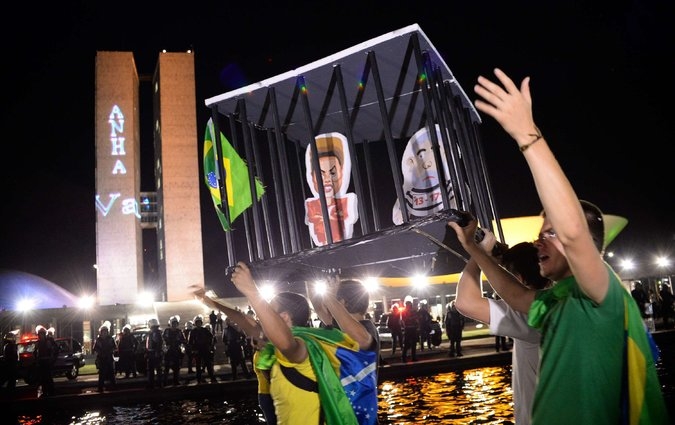
A protest against Brazil’s president, Dilma Rousseff, in Brasilia on Monday. Credit: Andressa Anholete/Agence France-Presse — Getty Images
The New York Times
March 26, 2016
by Vanessa Barbara
Contributing Op-Ed Writer
SÃO PAULO, Brazil — If you’re in Brazil these days, you shouldn’t wear red. Or grow a beard. In the current political climate, you’ll risk being tagged as a Communist and a supporter of the leftist Workers Party. You could be bullied and called mortadela (a sausage commonly regarded as a poor man’s food).
On the other hand, I wouldn’t wear the yellow-and-green jersey of the Brazilian soccer team, either. That could get you mistaken for a coxinha (fried chicken dumpling), a nickname given, inexplicably, to those calling for President Dilma Rousseff’s ouster. Nowadays, coxinhas hate the government — and mortadelas — with a passion most people reserve for someone who stole their parking space.
How did it come to this? The political situation in Brazil right now is a blend of “House of Cards” and “Game of Thrones.” The new season began on March 4, when Luiz Inácio Lula da Silva (popularly known as Lula), the former president and the distinguished leader of the Workers Party, was taken into custody by the Federal Police. He was questioned as part of an investigation into a sprawling graft scheme that has implicated many of his allies, including his former chief of staff and the treasurer of the Workers Party. Mr. da Silva gave about three hours of testimony, and then public prosecutors sought his arrest on suspicion of money laundering. (The warrant is still pending in the court.)
When he was released from questioning, the country was on fire. On one side, people celebrated, either out of joy that even a former president could be held accountable by the law or out of hatred for the Workers Party and Ms. Rousseff, Mr. da Silva’s handpicked successor, who is facing impeachment proceedings in Congress over allegations that she manipulated the state budget. On the other side, Mr. da Silva’s supporters worried that corporate media outlets, along with the judiciary and opposition parties, might be orchestrating a coup to remove leftists from power and put Brazil back in the hands of conservatives. (It doesn’t help that some of the people calling for Ms. Rousseff’s impeachment are also in favor of a military intervention.)
Since then there have been more cliffhangers. On March 13, more than a million people took to the streets across the country to protest the government. Three days later, Ms. Rousseff appointed Mr. da Silva as her chief of staff, a move that could shield him temporarily from prosecution because ministers can be judged only by Brazil’s highest court. On the same day, a federal judge leaked the wiretap recording of a telephone call between Ms. Rousseff and Mr. da Silva, in which she informed him that she would send the appointment papers “in case they are needed.” Critics say this proves the nomination’s purpose was to protect the former president from arrest; the president’s office says Ms. Rousseff had been misunderstood. Huge protests and counterprotests have clogged the streets since then.
For those who still support Ms. Rousseff, the judge’s decision to leak the audio recordings was outrageous, intended to incite demonstrations, and suggests that a handful of judges are willing to violate the privacy and civil liberties of high-level officials in order to bring down the government. Even many legal experts have said that the judiciary has breached protocol and acted outside the law, strongly suggesting that the release of intercepts is part of a coup. Government supporters also fear that the political crisis could create a political void that is filled by opportunists from the extreme right.
Both sides, it seems, have their own fears for the country’s future and their own versions of reality. The polarization between mortadelas and coxinhas has gotten so bad that you can’t even take your dog for a walk without hearing cries of “Fora Dilma!” (“Out with Dilma!”) or “Não vai ter golpe” (“There will be no coup”). In fact, a dog was attacked last week in Rio de Janeiro for wearing a red bandanna. Sometimes the angry opposition sounds like hysterical soccer fans: Every time Ms. Rousseff speaks on the evening newscast, people lean out their windows to bang pots, and drivers honk their horns in a sign of protest.
That is what frightens me. The frenzy seems to be escalating on both sides. It would be better now for Brazilians to calm down, listen carefully to one another (without pot-banging or blind alarmism) and let the criminal investigations run their course, provided they are carried out according to the law. It’s time to believe in the strength of our democratic institutions. And in the ideological neutrality of our dogs.

